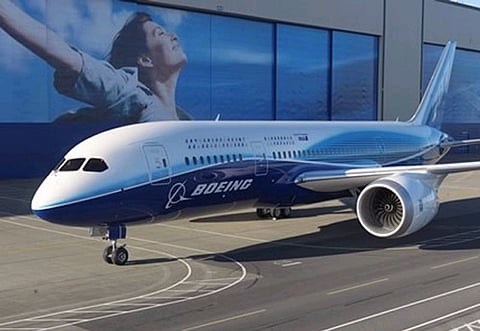Japan grounds all Boeing Dreamliners
Aircraft grounded after an emergency landing by an ANA flight

Tokyo: Japan’s two biggest airlines Wednesday grounded all their Dreamliners after an emergency landing by an ANA flight, but carriers insisted that Boeing’s troubled next-generation plane was still a safe bet.
The 787 Dreamliner has suffered more than a week of bad news that has prompted safety investigations by three national regulators, although Boeing says there is no fundamental problem with the highly fuel-efficient aircraft.
All Nippon Airways - the world’s first carrier to receive the Dreamliner from Boeing after years of delays - said a battery problem triggered a cockpit error message that forced the pilots to land the plane in southwestern Japan.
ANA said instruments had detected smoke in a forward electrical compartment, and Japanese Transport Minister Akihiro Ota said it was a “serious incident that could have led to a serious accident”.
One of the domestic flight’s 129 passengers was quoted by broadcaster NHK as saying he “smelled something strange” after take-off and feared the plane was going to crash.
Both Ota’s ministry and the US Federal Aviation Administration broadened existing probes into the Dreamliner to encompass the incident. Authorities in India said they were starting their own investigation.
ANA and its rival Japan Airlines (JAL) - among Boeing’s biggest customers for the Dreamliner - said they would ground their entire 787 fleets pending safety checks.
ANA has 17 Dreamliners in operation and JAL has seven. Both have dozens more on order in deals worth billions of dollars. ANA said there was no change to plans to take delivery of 20 more this financial year.
“We are not in a situation where we should change the strategy we have been pursuing,” ANA chief executive Shinichiro Ito told reporters after meeting with the transport minister.
The Dreamliner also received fresh backing from other Asia-Pacific carriers that have also bet big on the project, with Singapore Airlines (SIA) and Australia’s Qantas both affirming a combined total of 35 orders from affiliates.
SIA’s budget offshoot Scoot said it was “confident” that Boeing would resolve any issues with the 787. The new model also got a vote of confidence from Korean Air, which has ordered 10.
“Problems are bound to occur when new aircraft are being developed and put into operation. Recent problems involving the B787 are no different,” a Korean Air spokesman said.
The Dreamliner is seen as an aviation milestone with its use of lightweight composite materials and electronics, instead of aluminium and hydraulics. Boeing says a total of 49 have been delivered to airlines and nearly 850 are on order.
Boeing, which insists it has “complete confidence” in the plane, said after the forced landing in Japan: “We will be working with our customers and the appropriate regulatory agencies.”
Wednesday’s flight was heading from Ube, in Japan’s far west, to Tokyo when it diverted mid-flight to Takamatsu, on the island of Shikoku.
Police reported several “slight injuries” such as scratches after the passengers and eight crew members evacuated via emergency chutes, as fire trucks deployed.
Last week, there was a battery fire and smoke on an empty JAL-operated Dreamliner on the ground in the US city of Boston.
JAL said that involved the battery used for the Dreamliner’s auxiliary power unit, located at the rear of the plane. Wednesday’s incident involved the forward battery for the main power unit, ANA said.
Recent high-profile incidents are the latest setbacks after production glitches among Boeing’s large array of subcontractors - many of them Japanese - delayed delivery of the first plane to ANA by three years to 2011.
The problems bloomed last week with the fire in Boston, followed by a fuel leak on another JAL Dreamliner, also in Boston.
A cracked cockpit window then forced the cancellation of a Dreamliner flight in Japan before a JAL-operated plane suffered a fuel spill on Sunday at Tokyo’s Narita Airport.
Hajime Tozaki, an aviation expert at Waseda University, said JAL and ANA had both bet heavily on the Dreamliner and could be hammered if regulators ordered structural repairs.
“That would have a really grave impact because both JAL and ANA plan to put the aircraft into their European and American routes to compete with low-cost carriers,” Tozaki said, while stressing that Boeing’s rival Airbus had also suffered teething trouble with new models.



